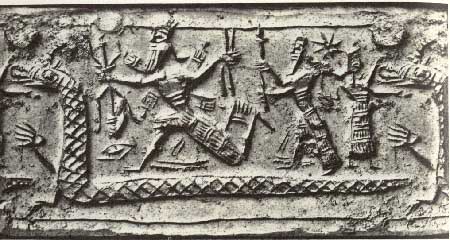 I'd like to continue with my argument. Let's examine the flood myth in Genesis. Did you know that there are actually two flood myths being told at the same time? Together, they contradict each other, but when separated they turn into a coherent story.
I'd like to continue with my argument. Let's examine the flood myth in Genesis. Did you know that there are actually two flood myths being told at the same time? Together, they contradict each other, but when separated they turn into a coherent story.In one version (J), God instructs Noah to take into the ark two of each unclean animal, and seven pairs of "clean" animals, for a sacrifice after the flood (Gen. 7:3). It says that the flood was caused by rain alone, and it rains for 40 days and nights. Noah then lets a dove out three times to look for land. First, it returns unable to find land. Second, it comes back with an olive leaf, and on the third try it doesn't come back (Gen. 8:8-12).
In the other version (P), God tells Noah to take two of each kind of animal, whether clean or unclean, onto the ark (Gen. 6:19-20). This version was probably a much older version of the flood myth. The cause of the flood is much more grandiose in this one as well, because the "windows of heaven" and the "fountains of the deep" are broken up (Gen. 7:11) ... and the flood lasts 150 days (Gen. 7:24). After the flood, Noah simply sends a raven to look for dry land (Gen. 8:7).
The first version I mentioned is based off a flood myth called "Atrahasis" (the cuneiform tablet above), and the second is based on "Enuma elish". At the end of "Atrahasis", the gods are attracted by the sweet smell of sacrifice and resolve to never again destroy humanity. Now look at Gen. 8:21. There are actually many variants of the flood myth that predate the Biblical account. The Epic of Gilgamesh is written about 100 years before the Bible's account (1100 BCE); Atrahasis has the most parallels with the Biblical account and is dated at about 1640 BCE; and Sumerian Eridu Genesis which dates back 3000 years BCE.

The second version of the flood is based off of the worldview of the "Enuma elish." This is evident because of the idea of heaven's windows opening and the opening of the deep. There was a fairly popular concept amongst ancient people that there was a solid firmament that separated chaos from the Earth. In fact, if we read the Genesis creation account you could see that there is mention of it, and that particular section of the creation account is based on the worldview provided by Enuma elish. Here is an interesting drawing of this firmament concept:
In "Enuma elish", Marduk sets his bow in the sky as a sign that the world order is established. Now look at Gen. 9:12-17, where God (El) sets his bow in the sky. The difference in these two versions is that the bow in "Enuma elish" is the star Sirius, and in Genesis it is a rainbow. However, in both stories the placement of both in the sky marks the final establishment of the earth as a settled place.
 1. Enuma elish - http://www.sacred-texts.com/ane/enuma.htm
1. Enuma elish - http://www.sacred-texts.com/ane/enuma.htm2. Atrahasis - Lambert W.G. and Millard, A.R. Atrahasis; the Babylonian Story of the Flood, 1999.
3. http://www.livius.org/fa-fn/flood/flood2-t.html (of interest is the chart at the bottom).



